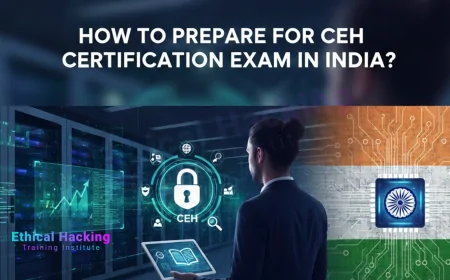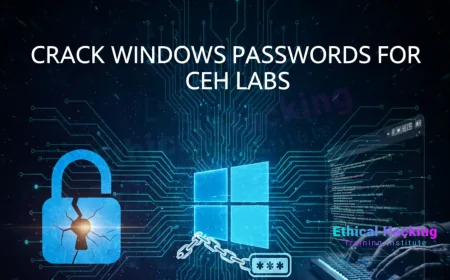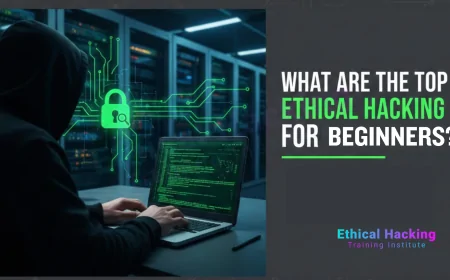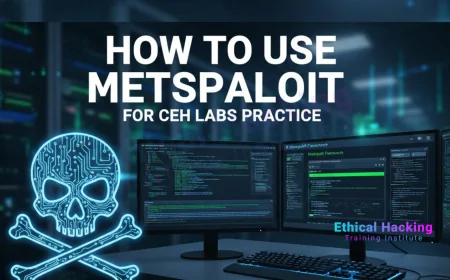Hacking Training: Where to Get Certified in Ethical Hacking and Cybersecurity | A Beginner’s Guide to Ethical Hacking Training and Cybersecurity Certifications
Discover top ethical hacking certifications, training providers, online courses, and FAQs to kickstart your cybersecurity career in 2025.
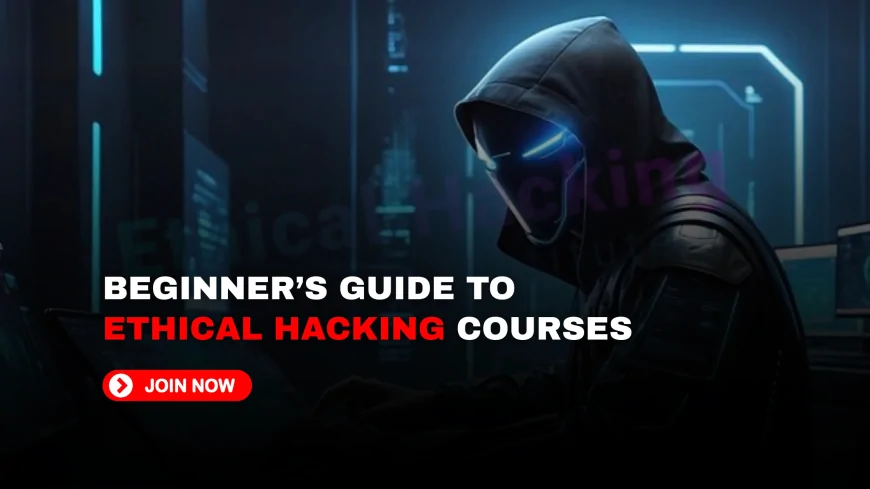
Table of Contents
- Introduction
- Why Get Certified?
- Popular Ethical Hacking Certifications
- Top Offline Training Institutions
- Leading Online Platforms
- Training Format Comparison
- Choosing the Right Training
- Typical Training Costs
- Hands-On Labs & Practice
- Exam Preparation Tips
- After Certification: Career Paths
- Maintaining Your Certification
- FAQs
- Conclusion
Introduction
As cyber threats continue to grow, becoming a certified ethical hacker or cybersecurity professional is more valuable than ever. Certifications like CEH, OSCP, and PenTest+ provide structured training, industry recognition, and hands-on labs. This guide helps you discover the top training providers—both in-person and online—so you can choose the right path.
Why Get Certified?
Certification validates your skills:
- Credibility: Demonstrate competence with recognized credentials.
- Career opportunities: Employers seek certified professionals.
- Hands-on expertise: Labs simulate real cyber-attacks.
- Career advancement: Higher salaries and job mobility.
Popular Ethical Hacking Certifications
- CEH (Certified Ethical Hacker): EC‑Council’s foundational ethical hacking credential.
- OSCP (Offensive Security Certified Professional): Brand‑name hands‑on penetration testing certification.
- CompTIA PenTest+: Vendor-neutral penetration testing with emphasis on planning and reporting.
- eCPPT (eLearnSecurity): Practical pen‑testing with web app focus.
- CKEH / CHFI: Specialized forensic and ethical hacking credentials.
Top Offline Training Institutions
WebAsha Technologies (Pune):
- EC‑Council ATC offering CEH v13, labs, mentoring, and placement. US‑based bootcamps covering CEH, Security+, and SOC Analyst training, OSCP preparatory classes with labs. Red‑Team focused hands‑on training aligned with OSCP and CPENT.
Leading Online Platforms
- EC‑Council iClass: Offered by EC-Council, CEH is a globally recognized credential for aspiring ethical hackers.
- Offensive Security: The OSCP is a performance-based credential known for its rigorous, real-world hacking challenges.
- Simplilearn: Instructor‑led CEH and PenTest+ training with labs and support.
- Udemy: Learn ethical hacking at your own pace with Udemy’s bestselling course by Zaid Sabih.
- TryHackMe and Hack The Box: Provide interactive, hands-on labs tailored to ethical hacking certifications.
- Coursera & IBM/Cisco: Beginner-to-intermediate cybersecurity pathways.
Training Format Comparison
| Platform | Mode | Labs | Ideal For |
|---|---|---|---|
| WebAsha (Pune) | Offline/Online | Yes | Structured CEH students |
| EC‑Council iClass | Online | iLabs | CEH aspirants |
| Offensive Security | Online | Self‑hosted labs | Advanced learners |
| Udemy | Online Self‑Paced | Some include labs | Budget learners |
Choosing the Right Training
Evaluate:
- Learning style: Live vs. self‑paced.
- Lab access: Virtual, instructor‑led, 24/7 available?
- Cost vs budget: Check for hidden fees, vouchers included?
- Instructor support: Mentoring, forums, Q&A.
- Career assistance: Placements, interview prep.
Typical Training Costs
- CEH Exam Voucher: ₹40k–₹50k (approx. USD 1200)
- Official Training: ₹55k–₹70k (video or live) including voucher & labs
- OSCP Course: USD 1,300–1,600 incl. lab access
- Udemy Courses: USD 10–30 per course (sale prices available)
- Bootcamps: ₹75k–₹120k including guidance & placements
Hands-On Labs & Practice
Practical skills are essential. EC‑Council’s iLabs, HTB, TryHackMe provide real-world pentest environments. Offline lab programs at WebAsha or Infosec help learners apply hacking techniques in supervised settings. OverTheWire and PortSwigger are also valuable for beginners.
Exam Preparation Tips
- Follow official syllabus modules closely
- Use flashcards for important terminology
- Build a lab schedule; weekly consistency matters
- Do 2–3 full-length practice exams
- Participate in peer study groups
- Keep track of CVEs and recent attack techniques
After Certification: Career Paths
- Ethical Hacker / Pen‑Tester
- Cybersecurity Analyst
- Red Team Operator
- Incident Responder
- Security Consultant
Maintaining Your Certification
Obtaining a cybersecurity certification like CEH, OSCP, or CompTIA PenTest+ is only the beginning. To stay current in this rapidly evolving industry, maintaining your certification through Continuing Education is essential. Most certifications have specific renewal periods and requirements. For example, EC-Council requires CEH holders to earn 120 Continuing Education Credits (ECEs) every three years to remain certified.
These credits can be earned through a variety of professional development activities, such as:
- Attending cybersecurity conferences and webinars
- Publishing research or blog articles
- Completing additional certifications or training courses
- Participating in ethical hacking challenges or CTFs
- Teaching or mentoring others in cybersecurity
You’ll also need to pay an annual membership fee (e.g., EC-Council charges $80/year for members) and submit your ECE credits through their Aspen portal or equivalent platform. Missing the renewal window can lead to your certification becoming inactive, requiring re-examination or penalty fees to reinstate it.
To make things easier, create a renewal plan right after earning your certification. Set reminders for ECE submission deadlines, and actively participate in cybersecurity communities to continuously build your knowledge and meet credit requirements. Staying certified not only keeps your resume strong but also ensures you remain competitive in the job market.
Frequently Asked Questions (FAQs)
1. What is the easiest ethical hacking certification?
CEH is regarded as one of the most accessible yet respected entry-level certifications.
2. Is OSCP harder than CEH?
Yes, OSCP is more technical and heavily hands-on, requiring time and dedication.
3. Can I prepare for CEH completely online?
Yes—platforms like EC‑Council iClass and WebAsha offer full online training with labs.
4. Which is better: self-paced or instructor-led training?
Instructor-led offers mentorship and interaction; self-paced can be cost-effective and flexible.
5. How long does it take to complete CEH training?
Typically 4–8 weeks full-time or 3–4 months part-time, depending on format and pace.
6. Can I get a job with CEH certificate?
Yes—especially for roles like ethical hacker, penetration tester, and cybersecurity analyst.
7. How often should I renew my certification?
Most certifications need renewal every 3 years with continuing education credits.
8. What does a typical bootcamp include?
Live sessions, labs, exam vouchers, career support, mentorship, and resume prep.
9. Are Udemy courses recognized by employers?
Yes, provided you demonstrate practical skills—Certs + portfolio = strong value.
10. Is there lab support after course completion?
Many providers offer extended lab access—confirm policies before enrolling.
11. Can I take OSCP without any experience?
Beginner to intermediate experience in Linux, networks, and scripting is strongly recommended.
12. Are training institutes in India effective?
Yes—organizations like WebAsha offer accredited training with hands-on labs and placement.
13. Which is costlier: OSCP or CEH?
OSCP may cost more upfront but offers self-hosted labs; CEH’s bundled training chips cost coverage.
14. Can I practice ethical hacking legally from home?
Yes—in online labs and platforms designed for safe, legal penetration testing.
15. Do certifications require recertification?
Yes—via continuing education credits and renewal fees every few years.
16. What's more important: certification or skills?
Both matter—but employers value demonstrable skills alongside recognized certifications.
17. Is CEH recognized globally?
Yes—it’s accepted by government agencies, Fortune 500 companies, and international firms.
18. How can I afford training costs?
Look for scholarships, early-bird discounts, or self-paced cheaper online courses.
19. Do online courses offer mentorship?
Many do—check for live Q&A sessions, Slack/Discord groups, and instructor office hours.
20. What should I do after getting certified?
Apply for entry-level roles, join hacker communities, and continue skills through bug bounties or CTFs.
Whether you prefer in-person training in Pune or flexible online platforms, there's a path suited to your learning style. For structured CEH preparation, accredited institutions like WebAsha and EC‑Council iClass are ideal. For hands-on mastery, OSCP and virtual labs excel. Choose wisely, get certified, and build a successful cybersecurity career.
Conclusion
What's Your Reaction?
 Like
0
Like
0
 Dislike
0
Dislike
0
 Love
0
Love
0
 Funny
0
Funny
0
 Angry
0
Angry
0
 Sad
0
Sad
0
 Wow
0
Wow
0






